Come Sunday in the wilderness .. oh to be a fly on the wall as the opposition plots away
Nov 12th, 2005 | By Counterweights Editors | Category: Ottawa Scene As of just after 6 PM, Saturday, November 12, journalist Sue Bailey is reporting that Canadian federal Conservative leader Stephen Harper, Bloc Quebecois leader Gilles Duceppe, and New Democrat leader Jack Layton are to meet in Ottawa on Sunday, November 13, “to discuss the next moves in their bid to disrupt, if not topple” Paul Martin’s Liberal minority government.
As of just after 6 PM, Saturday, November 12, journalist Sue Bailey is reporting that Canadian federal Conservative leader Stephen Harper, Bloc Quebecois leader Gilles Duceppe, and New Democrat leader Jack Layton are to meet in Ottawa on Sunday, November 13, “to discuss the next moves in their bid to disrupt, if not topple” Paul Martin’s Liberal minority government.
Meanwhile, three new opinion polls on Canadian federal party standings have arrived. They all suggest that a fresh election soon would not give a parliament much different from the one Canadians have now. They also suggest that a majority of Canadians still do not want an election until the spring of 2006.
Yet Sue Bailey’s academic informant David Docherty, at Wilfrid Laurier University, does seem to be onto something when he says: “I think we’ve lost the conditions of a functioning minority government.” And who knows? It may be starting to seem that something a bit strange is going to happen in Canadian federal politics.
Hopefully sooner than too much later, someone will figure out what it is. Stay tuned.
More new poll results to add to the confusion …
Quick tab of latest poll results from media reports over the November 1213 weekend:
|
Liberals |
34% |
33% |
33% |
|
Conservatives |
28% |
28% |
30% |
|
New Democrats |
19% |
21% |
20% |
|
Bloc Quebecois |
14% |
||
|
Green |
4% |
Also, according to Ipsos-Reid:
 “A majority of Canadians (57%) are of the opinion that there’s a lot of important work that still needs to be done by the government, so the spring is the earliest we should be holding an election’. Thirty-nine percent, however, feel politics in Ottawa has become dysfunctional, and we need an election now to clear the air’.
“A majority of Canadians (57%) are of the opinion that there’s a lot of important work that still needs to be done by the government, so the spring is the earliest we should be holding an election’. Thirty-nine percent, however, feel politics in Ottawa has become dysfunctional, and we need an election now to clear the air’.
“When asked to consider the likely outcomes of the next federal election, slightly more Canadians say they would prefer a minority government led by Paul Martin and the Liberals (48%) then say they would prefer one led by Stephen Harper and the Conservatives (42%) … Endorsement for a Liberal led minority government is highest in Atlantic Canada (61%), British Columbia (58%), and Ontario (51%) … Endorsement for Conservative led minority government is highest in Alberta (58%) and Quebec (49%) … Over half of Bloc Quebecois supporters (56%) and 28% of NDP supporters would prefer a Conservative led minority over a Liberal one.”
And, according to Ekos:
“A full 62 per cent said they wanted to see Justice John Gomery’s second report on the Liberal sponsorship scandal before rendering an electoral verdict next spring, as Martin has promised. Only 24 per cent said we should have an election as soon as possible this winter’ and another 13 per cent said we don’t need to have an election any time soon.'”
What does all of this mean?
At the moment of course the simplest truth is that no one in any part of the country – including Ottawa – really knows.
NOV 11 – FEBRUARY ELECTION PLOT: WHY NOT .. how long can this keep going on?
 John Ibbitson at the Globe and Mail is probably right when he says that it “is far too early to say how the Layton gambit” for a February federal election in Canada “will ultimately be received.” It is also no doubt undeniably true that all four federal party leaders are just looking to their own narrow advantage, in the increasingly absurd political game now going on in Ottawa.
John Ibbitson at the Globe and Mail is probably right when he says that it “is far too early to say how the Layton gambit” for a February federal election in Canada “will ultimately be received.” It is also no doubt undeniably true that all four federal party leaders are just looking to their own narrow advantage, in the increasingly absurd political game now going on in Ottawa.
(If the opposition parties really do believe that the government has lost its moral authority to govern, why don’t they just defeat the estimates on December 8 – which would bring a fresh election in January, long enough after the December holiday season? The crucial reason, apparently, is that then the election would be held before the release of the second Gomery report on February 1. And all three opposition parties, including Jack Layton’s noble NDP, want the second Gomery report in the election mix, because the polls at least dimly suggest that this could increase each of their shares of the vote.)
 At the same time, it also remains the simplest truth that Paul Martin’s Liberal minority government won only 37% of the popular vote in the previous June 2004 federal election – and just under 44% of the seats in parliament. It may want to govern, and not play politics, as if it did have a majority, but it clearly does not. And the fundamental principle of parliamentary democracy is that any government which cannot in one way or another command a majority in the popularly elected parliament cannot stay in office for any great length of time.
At the same time, it also remains the simplest truth that Paul Martin’s Liberal minority government won only 37% of the popular vote in the previous June 2004 federal election – and just under 44% of the seats in parliament. It may want to govern, and not play politics, as if it did have a majority, but it clearly does not. And the fundamental principle of parliamentary democracy is that any government which cannot in one way or another command a majority in the popularly elected parliament cannot stay in office for any great length of time.
Ever since this issue reached near-crisis proportions this past spring, the Martin government has been leaning on Jack Layton’s New Democrats. The Liberals and New Democrats together could at least speak with the moral authority of 53% of the popular vote in the 2004 election (even if they still did not have quite enough seats by themselves to reliably command parliament in the absolute crunch). Now that Mr. Layton has pretty clearly indicated his party no longer has confidence in the government, Mr. Martin’s administration is pretty clearly living on borrowed time. And, on some kind of very bottom line of the broader public interest, it is just not good for the political health of what the Constitution Act 1982 calls our “free and democratic society” for this time to go on too long.
The new Leger Marketing poll …
 Just to add to all the ironies and confusions of the present situation, a new Leger Marketing poll of federal party standings has confirmed the picture in the second Strategic Counsel poll of a few days ago (see below). The Leger Marketing “survey indicated the Liberals had 34 per cent support, compared with 26 per cent for the Conservatives, 18 per cent for the New Democratic Party and 11 per cent for the Bloc Quebecois. The poll was conducted between Nov. 1 – the day Justice John Gomery released his initial sponsorship report – and this Tuesday,” November 8.
Just to add to all the ironies and confusions of the present situation, a new Leger Marketing poll of federal party standings has confirmed the picture in the second Strategic Counsel poll of a few days ago (see below). The Leger Marketing “survey indicated the Liberals had 34 per cent support, compared with 26 per cent for the Conservatives, 18 per cent for the New Democratic Party and 11 per cent for the Bloc Quebecois. The poll was conducted between Nov. 1 – the day Justice John Gomery released his initial sponsorship report – and this Tuesday,” November 8.
So now we have had two polls over the period November 46, suggesting that the Liberals did take a substantial enough initial hit from the November 1 release of the first Gomery report on the sponsorship scandal, followed by two polls over the period November 79, suggesting that they have recovered from this initial hit with some remarkable speed.
 You might say that the two most recent polls also suggest that, yet again, there really is no great urgency in holding a fresh federal election. At the moment the most likely result of such an election will just be a parliament very similar to the one we have now. So what’s the hurry?
You might say that the two most recent polls also suggest that, yet again, there really is no great urgency in holding a fresh federal election. At the moment the most likely result of such an election will just be a parliament very similar to the one we have now. So what’s the hurry?
Yet it says something about just how absurd the present situation in Ottawa has become that 34% popular support (or even 35% in the latest Strategic Counsel poll) can be taken as good news for the Liberals – and even as a good reason for the present Liberal minority government to remain in office, even without the additional 18% (or 16%) of their onetime New Democrat friends. What kind of democracy is that?
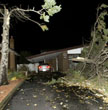 What the past year and a half, since the June 2004 election, finally does seem to have shown is that if the people of Canada in their infinite wisdom are determined to keep electing parliaments similar to the one we have now, the government of Canada has to be managed rather differently from the way it has been managed over the past year and a half. If all this is true, it may just take another election, sooner not later, to drive this point home to Canadian political leaders.
What the past year and a half, since the June 2004 election, finally does seem to have shown is that if the people of Canada in their infinite wisdom are determined to keep electing parliaments similar to the one we have now, the government of Canada has to be managed rather differently from the way it has been managed over the past year and a half. If all this is true, it may just take another election, sooner not later, to drive this point home to Canadian political leaders.
(Or who knows? Maybe the Liberals actually can win a majority in the next election, despite everything else. And Ottawa can go back to the present status quo, to which it seems so attached. And the rest of us can go back to sleep – and just let the old natural governing party continue to govern, as best as it can.)
If it’s only six weeks to two months either way, “sooner not later” probably has become the best option …
 One high-minded good reason for the now uniformly disaffected opposition leaders not to pull the plug on the Martin government over the next month is the first Canadian Aboriginal leaders/First Ministers conference, to be held in Kelowna, BC at the end of November.
One high-minded good reason for the now uniformly disaffected opposition leaders not to pull the plug on the Martin government over the next month is the first Canadian Aboriginal leaders/First Ministers conference, to be held in Kelowna, BC at the end of November.
The key logic here would seem to be that this Kelowna conference will at least be addressing one of the more fundamental problems of Canada today, that have been put off for too long, in the wake of the premature and disruptive constitutional struggles of the late 1980s and early 1990s, which finally led to the second Quebec sovereignty referendum in 1995 (and even to the sponsorship scandal itself). Once the Kelowna conference has done its lofty work, however, the same kind of higher logic just might suggest that it now makes most sense to have the next federal election sooner not later too.
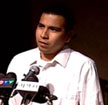 For at least one strategic block of voters, in various regions of the country (including the West), the great concern about bringing the government down this past spring was that Stephen Harper’s Conservatives, helped along by a Bloc Quebecois that only wanted to destroy Canada in the end, were trying to use inflated claims about corruption to sneak in a right-wing agenda not unlike that of George W. Bush in the giant neighbouring country next door. (And this was a prospect that the 2004 election results indicated a decisive majority of Canadians do not want.) But now that Jack Layton and the New Democrats have pretty clearly stepped over onto the side of the Conservatives and the Bloc, the underlying issue looks different.
For at least one strategic block of voters, in various regions of the country (including the West), the great concern about bringing the government down this past spring was that Stephen Harper’s Conservatives, helped along by a Bloc Quebecois that only wanted to destroy Canada in the end, were trying to use inflated claims about corruption to sneak in a right-wing agenda not unlike that of George W. Bush in the giant neighbouring country next door. (And this was a prospect that the 2004 election results indicated a decisive majority of Canadians do not want.) But now that Jack Layton and the New Democrats have pretty clearly stepped over onto the side of the Conservatives and the Bloc, the underlying issue looks different.
At its high-minded best at any rate, the issue now can be more plausibly seen as one of democratic reform and renewal in Canada at large – which can also be fit into the broad fundamental-problem logic of the aboriginal issues conference in Kelowna. (And it is not surprising in this context that on November 10 Duff Conacher’s Democracy Watch in Ottawa came out swinging against how “LIBERALS DELAY AND DECEIVE ON DEMOCRATIC REFORMS .”)
 Looking at things this way does not imply any inflated evaluation of what Jack Layton and his New Democrats are trying to do. They are clearly enough playing the same narrow, self-interested political game as everyone else. And at some points in his most recent unsuccessful attempts to negotiate a better deal with the Liberals, Mr. Layton and his advisors did seem to be forgetting that their party won only 16% of the Canada-wide vote in the last election.
Looking at things this way does not imply any inflated evaluation of what Jack Layton and his New Democrats are trying to do. They are clearly enough playing the same narrow, self-interested political game as everyone else. And at some points in his most recent unsuccessful attempts to negotiate a better deal with the Liberals, Mr. Layton and his advisors did seem to be forgetting that their party won only 16% of the Canada-wide vote in the last election.
There are apparently certain technical problems of parliamentary procedure in the current “Layton gambit” for a February federal election in Canada. And, as John Ibbitson has noted as well, “the Liberals will have the next eight weeks to figure out a strategy” of their own, “and their procedural experts are the best in the business.”
 But it seems equally clear that, on the fundamental principles of parliamentary democracy again, if the three opposition parties can somehow get and stay together on some kind of February election plan, they have the decisive democratic numbers to bring the government down, and force a fresh election. (Or at least if they don’t have this ability technically under these circumstances, then the Canadian political system really will be in a state of constitutional crisis.)
But it seems equally clear that, on the fundamental principles of parliamentary democracy again, if the three opposition parties can somehow get and stay together on some kind of February election plan, they have the decisive democratic numbers to bring the government down, and force a fresh election. (Or at least if they don’t have this ability technically under these circumstances, then the Canadian political system really will be in a state of constitutional crisis.)
It seems clear enough in advance that for the three opposition parties together to make this kind of scheme work, they will have to come up with some sort of arrangement that will finally leave none of them with any special advantage in the next election. Mr. Layton’s ultimate claim to fame will simply be to have started the process. Each of Mr. Harper and M. Duceppe will have to have their own parallel claims to fame, that all the others accept. Or something like that.
 At this juncture, there are more than a few good reasons for predicting that the three opposition leaders and their various advisors will in fact not prove up to the challenge – and that the long-seasoned shrewd and cunning neo-Machiavellian Liberals will ultimately get their own way once again, and hold an election some six weeks to two months later, in April 2006.
At this juncture, there are more than a few good reasons for predicting that the three opposition leaders and their various advisors will in fact not prove up to the challenge – and that the long-seasoned shrewd and cunning neo-Machiavellian Liberals will ultimately get their own way once again, and hold an election some six weeks to two months later, in April 2006.
But if the Conservatives, the Bloc Quebecois, and the New Democrats actually can put together some sort of February election plan that works, over the next eight weeks themselves, that could just be quite a constructive thing for the future of Canadian politics – and even for the future of the independent free and democratic society in northern North America, in the 21st century. So here’s wishing good luck to the united democratic loyal opposition. (Oh, and by the way, Happy Remembrance Day too – and eternal best wishes to all the people who have actually laid down their lives for all the parts of the country, in the already rather long Canadian past.)
NOV 8-10: MERCURIAL MOODS IN THE NORTH COUNTRY .. already the plot un-thickens, and then thickens again?
 [UPDATED WEDNESDAY, NOVEMBER 9]. “Canada,” the British-American economist Kenneth Boulding said in 1977, not long after the Parti Quebecois had won its first provincial election in Quebec, is an “absurd country straight out of Gilbert and Sullivan … whose very existence is an object lesson to the whole world … I’ve always thought, If Canada could exist, what couldn’t’?”
[UPDATED WEDNESDAY, NOVEMBER 9]. “Canada,” the British-American economist Kenneth Boulding said in 1977, not long after the Parti Quebecois had won its first provincial election in Quebec, is an “absurd country straight out of Gilbert and Sullivan … whose very existence is an object lesson to the whole world … I’ve always thought, If Canada could exist, what couldn’t’?”
Were he still alive, Mr. Boulding would appreciate the latest opinion poll on Canadian federal politics. The Strategic Counsel, which recently told us that as of November 23 Stephen Harper’s Conservatives had 31% of Canada-wide voter support, while Paul Martin’s beleaguered Liberals had only 28%, is now reporting that as of November 56 the Conservatives have only 28%, and the Liberals have 35%.
 You might wonder just what this means for the new electoral calculations that New Democrat leader Jack Layton introduced in his talk to the Empire Club in Toronto on November 7. On what is still probably the best guess extant, however, the whole situation in Ottawa has now become so absurd that there might as well be a fresh federal election “sooner not later,” as Mr. Layton has already said – sometime in the last half of January 2006.
You might wonder just what this means for the new electoral calculations that New Democrat leader Jack Layton introduced in his talk to the Empire Club in Toronto on November 7. On what is still probably the best guess extant, however, the whole situation in Ottawa has now become so absurd that there might as well be a fresh federal election “sooner not later,” as Mr. Layton has already said – sometime in the last half of January 2006.
(And now, just to start thickening the plot once again, as of November 9, 1:42 PM EST, the Globe and Mail is reporting that: ” NDP Leader Jack Layton has proposed an election call for early January, resulting in an election the following month.” He “called the move a ‘reasonable’ compromise that allows Canadians to avoid a holiday election but doesn’t let the Liberal government decide the timing … Mr. Layton said the NDP will introduce a motion on Nov. 24, its first Opposition day in the House of Commons.” So stay tuned. One way or another something is going to happen.)
The new Strategic Counsel poll results …
How would Canadians vote if an election were held today?
|
SC Nov 56 |
SC Nov 23 |
2004 election |
|
|
Liberals |
35% |
28% |
37% |
|
Conservatives |
28% |
31% |
30% |
|
New Democrats |
16% |
20% |
16% |
|
Bloc Quebecois |
13% |
13% |
12% |
|
reen |
8% |
7% |
4% |
Regional results, Nov 56
|
Quebec |
Rest of Canada |
Ontario |
West |
|
|
Liberals |
30% |
37% |
44% |
25% |
|
Conservatives |
5% |
36% |
31% |
42% |
|
New Democrats |
9% |
18% |
18% |
20% |
|
Bloc Quebecois |
50% |
|||
|
Green |
6% |
8% |
7% |
12% |
Polling details: The results are based on telephone interviews conducted between Nov. 5 and Nov. 6, 2005. The weighted national sample of 1,000 adult Canadians yields a margin of error of +/- 3.1 percentage points, 19 times out of 20.
MORE TO COME SOON …
NOV 7 – JACK & JUSTIN UP THE HILL IN CANADA .. and what if the USA had a parliamentary democracy too?
 EMPIRE CLUB, TORONTO. MONDAY, NOVEMBER 7, 2005. 2 PM. Everyone is saying they are not surprised by the latest thickening of the flagging plot in Canadian federal politics. But even a month ago no one was exactly predicting that New Democrat leader Jack Layton would be the man who finally pulled the plug on Paul Martin’s Liberal minority government.
EMPIRE CLUB, TORONTO. MONDAY, NOVEMBER 7, 2005. 2 PM. Everyone is saying they are not surprised by the latest thickening of the flagging plot in Canadian federal politics. But even a month ago no one was exactly predicting that New Democrat leader Jack Layton would be the man who finally pulled the plug on Paul Martin’s Liberal minority government.
So far – or at least immediately after Mr. Layton’s confession of his almost certain ultimate lack of confidence in Mr. Martin’s government now, in a lunch-hour talk at the Empire Club in Toronto – Conservative leader Stephen Harper is still saying that he cannot quite believe his ears. And Bloc Quebecois leader Gilles Duceppe is still a bit coy too. The most he will say is that if the two federalist opposition parties are both really prepared to bring the government down at last, no one should be counting on the Bloc to save Paul Martin’s skin.
 What the people of Canada almost seem to have on their hands is three opposition party leaders who all say that they are prepared to bring the Martin government down, if some other leader takes the initiative. Yet as Mr. Layton has noted, there will be various parliamentary opportunities for someone to take the initiative over the next month or so. And it now almost does seem likely enough that Canadians will be going to the polls sooner rather than later – not quite in the middle of the December holiday season, which almost no one would really like, but perhaps sometime in January 2006.
What the people of Canada almost seem to have on their hands is three opposition party leaders who all say that they are prepared to bring the Martin government down, if some other leader takes the initiative. Yet as Mr. Layton has noted, there will be various parliamentary opportunities for someone to take the initiative over the next month or so. And it now almost does seem likely enough that Canadians will be going to the polls sooner rather than later – not quite in the middle of the December holiday season, which almost no one would really like, but perhaps sometime in January 2006.
Meanwhile, at another meeting in Toronto, on the night of Monday, November 7, Justin Trudeau and others will be urging Paul Martin’s beleaguered government to at least save the Nahanni National Park Reserve and World Heritage Site in the Northwest Territories from a sleazy mining developer – as good Clear Grit karma for whenever the coming next federal election comes. And it remains hard not to wonder if the blessings of the old parliamentary democracy are finally wasted on our modest scene in Canada. If the neighbouring States of the Union had just such a flexible and publicly responsive system of modern democratic government, the global village might not have to still look forward to three more years of George W. Bush.
A somewhat deeper look at Jack’s new calculations in Canada
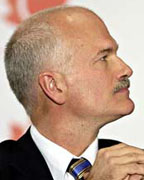 The two new polls on November 4 and 5, showing that the Liberals actually were taking a big hit from the release of the first Gomery report on the sponsorship scandal (see below), may not have been all that surprising. And the anti-Liberal reaction they reflect may still not last that long. But they do seem to have finally signaled to Jack Layton (and apparently such veteran New Democrat MPs as Bill Blaikie and Ed Broadbent) that it was time to change the NDP tune.
The two new polls on November 4 and 5, showing that the Liberals actually were taking a big hit from the release of the first Gomery report on the sponsorship scandal (see below), may not have been all that surprising. And the anti-Liberal reaction they reflect may still not last that long. But they do seem to have finally signaled to Jack Layton (and apparently such veteran New Democrat MPs as Bill Blaikie and Ed Broadbent) that it was time to change the NDP tune.
Conservative leader Stephen Harper claims to remain concerned that Mr. Layton is just using his newfound lack of confidence in the Martin government as a bargaining chip, to get the Liberals to move still closer to NDP positions on key issues such as health care privatization. But the smart money now seems to be reading the underlying calculations more or less as follows.
The New Democrats are serious enough about their fresh intentions. No opposition party, however, wants to bring the government down so soon as to precipitate a fresh election in the middle of the late-December holiday season. So the Conservatives will be passing up the opportunity when their so-called opposition day in parliament comes along on November 15.
According to MP Monte Solberg, on TV on the evening of November 7, the Conservatives want the NDP to propose a general non-confidence motion on the corruption issue when their opposition day comes up on November 24. But Mr. Layton and his colleagues are unlikely to provide the kind of motion the Conservatives want. (And the Bloc Quebecois is just waiting for the two federalist parties to get their acts together, before it is ready to move too.)
Fortunately (or otherwise, if you are a Liberal, perhaps), what traditionally amounts to a confidence issue on government financial legislation (the supplementary estimates) is scheduled to come up for a vote in parliament on December 8, without any opposition party proposing anything. This should give all of the Conservatives, Bloc, and NDP a neutral opportunity to vote against the government, together at last. And, still more conveniently, it is late enough to put the next election off until mid to late January 2006.
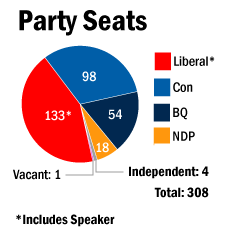 As an obscure item in the Globe and Mail over the November 56 weekend also pointed out, even if the NDP were to finally support the government once again on December 8, the exact numbers of seats for all concerned are once again so close as to make it rather uncertain whether the Martin government could survive in any case: “There are currently 133 Liberals, 98 Conservatives, 54 Bloc MPs, 18 NDP MPs and four Independents.” If just two of the Independents voted against the Liberals on December 8, “the government could fall 154-153, even with the support of the NDP and the two remaining Independents.”
As an obscure item in the Globe and Mail over the November 56 weekend also pointed out, even if the NDP were to finally support the government once again on December 8, the exact numbers of seats for all concerned are once again so close as to make it rather uncertain whether the Martin government could survive in any case: “There are currently 133 Liberals, 98 Conservatives, 54 Bloc MPs, 18 NDP MPs and four Independents.” If just two of the Independents voted against the Liberals on December 8, “the government could fall 154-153, even with the support of the NDP and the two remaining Independents.”
These last calculations do not take account of three Conservative MP s known to be fighting cancer, who might not be able to be in the House on December 8. But they do highlight the extent to which the situation in the parliament at Ottawa has now become so unstable as to make a fresh federal election “sooner not later” (as Jack Layton put it in his Empire Club talk) quite arguably the most sensible thing to do on broad public interest grounds.
As some observers continue to stress, if polls over the month between now and December 8 start to show the Liberals regaining the public support they have just lost (as did happen earlier on this year), Jack Layton’s New Democrats just might start changing their tune yet again. Others will argue that, short of some stunningly surprising Liberal decision to effectively join the 18-member NDP caucus, it now does seem increasingly hard to see how Mr. Layton will be able to credibly vote with the government on December 8, without making his November 7 remarks at the Empire Club seem rather unethical in their own right.
Justin Trudeau at the Nahanni and the lack of parliamentary democracy in the USA
 Monday, November 7 in Toronto also marked “the launch of” a “two-month, 17-city campaign which ends Jan. 19 in Calgary,” to save the Nahanni National Park Reserve and World Heritage Site in the Northwest Territories from the potential ravages of “a plan by Vancouver-based Canadian Zinc Corp. to operate a base-metal mine at Prairie Creek upstream from the park.”
Monday, November 7 in Toronto also marked “the launch of” a “two-month, 17-city campaign which ends Jan. 19 in Calgary,” to save the Nahanni National Park Reserve and World Heritage Site in the Northwest Territories from the potential ravages of “a plan by Vancouver-based Canadian Zinc Corp. to operate a base-metal mine at Prairie Creek upstream from the park.”
If the latest political calculations of the Ottawa smart money prove more or less correct, this enterprise, organized by the Canadian Parks and Wilderness Society, just might nicely parallel the “sooner not later” federal election campaign that Jack Layton has been talking about. The intrepid Canadian wilderness traveler Pierre Trudeau established Nahanni National Park in 1972. By all accounts it is an amazing chunk of the often stunning geographical heritage of northern North America (that perhaps most Canadians alas too seldom manage to see).
 Pierre (and Margaret) Trudeau’s eldest son, Justin, now 33 years old, is playing an important role in the Nahanni campaign kick-off. According to his new “poised, self-possessed, funny and spirited” wife, Sophie Gregoire, however, if Justin Trudeau ever is going to follow-up on his father’s political career as the northern magus of the modern Liberal Party of Canada, “it’s not going to be now. It’s not going to be for a long time.”
Pierre (and Margaret) Trudeau’s eldest son, Justin, now 33 years old, is playing an important role in the Nahanni campaign kick-off. According to his new “poised, self-possessed, funny and spirited” wife, Sophie Gregoire, however, if Justin Trudeau ever is going to follow-up on his father’s political career as the northern magus of the modern Liberal Party of Canada, “it’s not going to be now. It’s not going to be for a long time.”
At the same time, the Nahanni campaign is “calling on Canadians to urge Prime Minister Paul Martin and other MPs to act quickly to expand the park as promised.” And you can’t help wondering a bit if some neo-Machiavellian plotters somewhere in an Ottawa-Gatineau restaurant are thinking about asking Justin Trudeau to run as a Liberal candidate in the coming federal election, whenever it comes? It could be another rabbit out of the hat – on a par with appointing Michaelle Jean to succeed Adrienne Clarkson as governor general (if not quite as brilliant as luring Belinda Stronach across the floor this past spring).
 Conservative leader and prospective new prime minister of Canada Stephen Harper has already made clear that he harbors no kind of admiration for Pierre Trudeau at all. At the recent annual Ottawa press gallery festivities, Mr. Harper called Justin Trudeau’s father a “desiccated monkey.” Even allowing for what is expected at these events, this seemed an odd characterization of someone who was almost certainly more physically vigorous than Mr. Harper himself.
Conservative leader and prospective new prime minister of Canada Stephen Harper has already made clear that he harbors no kind of admiration for Pierre Trudeau at all. At the recent annual Ottawa press gallery festivities, Mr. Harper called Justin Trudeau’s father a “desiccated monkey.” Even allowing for what is expected at these events, this seemed an odd characterization of someone who was almost certainly more physically vigorous than Mr. Harper himself.
Whatever you might think about Pierre Trudeau, in his heyday he did seem to many Canadians (including such enemies as Peter Lougheed from Alberta, e.g.) to care about Canada and its future, in an almost visceral way. And it is not easy to think of any Canadian political leader nowadays, about whom quite the same kind of thing can be altogether convincingly said.
* * * * * *
 Another change between the heyday of Pierre Trudeau and today often at least seems to be that increasing numbers of even politically well-informed Canadians are less clear than they used to be about both the philosophical and practical differences between the parliamentary democracy Canada has inherited from the modern history of Western Europe, and the presidentialcongressional democracy that the American giants next door invented almost all by themselves in the late 18th century.
Another change between the heyday of Pierre Trudeau and today often at least seems to be that increasing numbers of even politically well-informed Canadians are less clear than they used to be about both the philosophical and practical differences between the parliamentary democracy Canada has inherited from the modern history of Western Europe, and the presidentialcongressional democracy that the American giants next door invented almost all by themselves in the late 18th century.
In the midst of growing and essentially positive Canadian enthusiasm for an assortment of much-needed democratic reforms in Canadian politics, some of which are addressed to certain contemporary weaknesses in the parliamentary model, it is probably worth noting how comparative Canadian and US politics in the somewhat strange year of 2005 also highlight some of parliamentary democracy’s continuing strengths.
When you have rigidly fixed election dates, as the US system does, e.g., it is not possible to go through the kind of ultimately constructive exercise in bringing a government down and forcing a fresh election that Canada now just might be going through over the next few months.
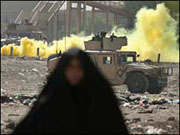 And you can say as much as you like about the evidence of Liberal political corruption in Justice Gomery’s first report on the sponsorship scandal in Canada. There are quite arguably still considerably better reasons for bringing down George W. Bush’s government in Washington right now, and forcing a fresh election in the United States, than there are for bringing down Paul Martin’s government in Ottawa, and forcing a fresh election in Canada.
And you can say as much as you like about the evidence of Liberal political corruption in Justice Gomery’s first report on the sponsorship scandal in Canada. There are quite arguably still considerably better reasons for bringing down George W. Bush’s government in Washington right now, and forcing a fresh election in the United States, than there are for bringing down Paul Martin’s government in Ottawa, and forcing a fresh election in Canada.
Be that as it may (in the eyes of many Canadian voters, including many who probably won’t vote for Paul Martin), Mr. Bush is just not going to be facing the same kinds of problems as Mr. Martin over the next few months. The acerbic American critic Gore Vidal has sometimes argued that his country should change to a parliamentary system of modern democratic government. But it has not, and there seems no at all serious prospect that it ever will.
 Short of a successful version of the highly destabilizing and crisis-inducing impeachment process that rabid Republicans unsuccessfully visited on Bill Clinton in the late 1990s (and the more successful prospect of which forced Richard Nixon to resign in the mid 1970s), there is no straightforward constitutional way of removing George W. Bush from office – even if he has already lost the confidence of the American people and the moral authority to govern (as some serious commentators on PBS TV have already said he actually has).
Short of a successful version of the highly destabilizing and crisis-inducing impeachment process that rabid Republicans unsuccessfully visited on Bill Clinton in the late 1990s (and the more successful prospect of which forced Richard Nixon to resign in the mid 1970s), there is no straightforward constitutional way of removing George W. Bush from office – even if he has already lost the confidence of the American people and the moral authority to govern (as some serious commentators on PBS TV have already said he actually has).
Despite all his current troubles, George W. Bush will be remaining President of the United States for the next three years. And just what that is going to mean for the global village at large remains a troubling enough question. (Whatever else, a president who continues in a state of having lost the confidence of the American people and the moral authority to govern is just not going to be able to provide the kind of international leadership that the USA no doubt ought to be providing, at the current juncture in the history of planet earth, etc.)
In the end of course it is the principles of democratic government that finally count, and not the particular different forms in which they are expressed in different free and democratic societies. There is certainly no ultimately objective way of saying that any one form is better than any other. Yet even a fairly casual look at comparative Canadian-US politics today does suggest that there is absolutely no good reason at all for Canada to abandon its traditional and now quite-long-established parliamentary form of democracy, in the interest of some vague contemporary misconceptions of North American democratic reform.
NOV 2-6: THE FIRST GOMERY REPORT .. new polls say Canadian political plot is thickening ..
 [UPDATED NOV 5 – INCLUDINGÂ NEW POLLS THATÂ SAY LIBERALS AREÂ IN BIG NEW TROUBLE …Â AT LAST]. The ultimate test of anything in the global village nowadays is how the financial markets see it? Right? And by that test the first Gomery report on the sponsorship scandal in Canadian federal politics was good news for Paul Martin’s still harried Liberal minority government in Ottawa. As a Reuters item has summed it all up: “Canada dollar rises as Gomery report clears Martin.”
[UPDATED NOV 5 – INCLUDINGÂ NEW POLLS THATÂ SAY LIBERALS AREÂ IN BIG NEW TROUBLE …Â AT LAST]. The ultimate test of anything in the global village nowadays is how the financial markets see it? Right? And by that test the first Gomery report on the sponsorship scandal in Canadian federal politics was good news for Paul Martin’s still harried Liberal minority government in Ottawa. As a Reuters item has summed it all up: “Canada dollar rises as Gomery report clears Martin.”
Domestically the news also seemed pretty good for the Martin Liberals at first (until two new polls on party standings): “The only issue is: Is Paul Martin implicated?” So Allan Gregg, chairman of The Strategic Counsel, said on CTV’s Question Period, a few days before the report’s release on Tuesday, November 1.
“If the answer is yes,” Mr. Gregg went on, “I think we’re into an election right away, I think all three parties will coalesce to defeat the government. If the answer is no, then they clearly will let Parliament continue to work.” As we at last know now, the Gomery report has gone so far as to say that Paul Martin is entitled to be “exonerated.”
That at least appeared to be what was most important, until a new Ipsos-Reid poll on November 4 – and a new Strategic Counsel poll on November 5 – suddenly made Canadian federal politics seem more interesting again. Read on for further dramatic facts and figures!
The new polls … what a difference a day makes … 
Just when it seemed that there were no surprises left in Canadian federal politics, two new polls are saying that the plot has thickened again, big time: “Despite Justice John Gomery’s report exonerating’ Prime Minister Paul Martin in what has become known as the Quebec Sponsorship Scandal, support for his embattled party among decided voters has plummeted to a low not witnessed since May 2005.”
First on board was an Ipsos-Reid poll taken on November 1 and 2 (the day when the first Gomery report was released and the following day). It contrasted sharply with another Ipsos-Reid poll taken over the only slightly less recent period October 2527. And then, for added excitement, on Saturday, November 5, the same envelope was pushed still further by a November 23 Strategic Counsel poll, which actually puts the Tories ahead of the Grits.
What party would you vote for in the next federal election?
|
SC Nov 23 |
IR Nov 12 |
IR Oct 2729 |
|
|
Liberals |
28% |
31% |
38% |
|
Conservatives |
31% |
30% |
26% |
|
New Democrats |
20% |
19% |
18% |
|
Bloc Quebecois |
13% |
13% |
11% |
|
Green |
5% |
5% |
Surprisingly enough as well, both polls suggest some striking change in the cynical and stodgy old most populous province of Ontario.
Here, according to Ipsos-Reid “the Conservatives (38%, + 8 points) have now rebounded to neck-and-neck with the Liberals (38%, 4 points).” And in Ontario’s old sister province of Quebec, “the Bloc Quebecois now have 52% of the Federal vote (+ 5 points) with the Liberals being thrashed-down a whopping 13 points to only 20%.”
According to the Strategic Counsel: “In seat-rich Ontario, the two parties leading in the poll [Conservatives and Liberals] each had 35 per cent of support. The NDP now leads in British Columbia, while the Bloc has 57 per cent of the francophone vote.”
It is no doubt worth stressing that the Strategic Counsel poll “is considered accurate to within 3.1 percentage points, 19 times out of 20. With that kind of margin of error, the Liberals and Conservatives could be seen to be in a virtual tie for support.”
Similar technical cautions apply to the Ipsos-Reid poll.
At the same time, it is also being reported that: “Given the national vote numbers as expressed above, if these decided voters were to hold onto these views in an election, Stephen Harper and his Conservative Party would form a minority government.”
Just what does it all mean?
 The thing about surprises is that you are surprised. Who knows just what kind of fuel the new polls will finally add to what had earlier seemed the not all-that-interesting embers smoking away in the Ottawa parliament?
The thing about surprises is that you are surprised. Who knows just what kind of fuel the new polls will finally add to what had earlier seemed the not all-that-interesting embers smoking away in the Ottawa parliament?
For starters, a somewhat uncomfortable New Democrat leader Jack Layton, on TV on Friday, November 4, was saying that he would take a while to consider the offer he has just received from the Liberals – about resisting present trends towards increasing private supplements to public health care in Canada.
It clearly does seem to be Mr. Layton who has the hot potato at the moment. Since the Gomery report’s release on November 1, Stephen Harper’s Conservatives and Gilles Duceppe’s Bloc Quebecois have both seemed to be saying that they are probably ready to bring down the embattled Liberal minority government, and precipitate a fresh federal election very soon – so long as Jack Layton’s NDP is on board to provide the altogether decisive votes.
 On the other hand, the new polls arguably just sharpen Mr. Layton’s private dilemma of being dammed if he doesn’t and dammed if he does. Ipsos-Reid is also reporting that: “Most Canadians (55%) are of the opinion that in light of what was revealed in the first Gomery Report, an election can wait until 30 days after Justice Gomery releases his second report in February'” (as Prime Minister Martin has already promised). Only “22% believe that because of what has been revealed in the report the Prime Minster needs to call an election 30 days from now’.”
On the other hand, the new polls arguably just sharpen Mr. Layton’s private dilemma of being dammed if he doesn’t and dammed if he does. Ipsos-Reid is also reporting that: “Most Canadians (55%) are of the opinion that in light of what was revealed in the first Gomery Report, an election can wait until 30 days after Justice Gomery releases his second report in February'” (as Prime Minister Martin has already promised). Only “22% believe that because of what has been revealed in the report the Prime Minster needs to call an election 30 days from now’.”
The parliamentary calendar apparently means that the government cannot be defeated until the middle of November. This could put the very early election that only 22% really want into the late December holiday season – which could finally annoy almost everyone.
The smart money still seems to be saying that there will probably not be an election before the early spring of 2006. Meanwhile, Jack Layton just has to figure out some way of making it clear that, while he is not going to take the blame for an early election that only 22% of the voters really want, he is not going to be seen as propping up a Martin Liberal minority government still tainted by the corruption of its Chretien Liberal predecessors either.
 Even if the new Conservative poll numbers were to hold up this time (as they did not this past spring, e.g.), a Stephen Harper Conservative minority government is likely to be even more unstable than the present Paul Martin Liberal minority government. (As also recently stressed by pundit John Ibbitson.)
Even if the new Conservative poll numbers were to hold up this time (as they did not this past spring, e.g.), a Stephen Harper Conservative minority government is likely to be even more unstable than the present Paul Martin Liberal minority government. (As also recently stressed by pundit John Ibbitson.)
It seems unlikely, e.g., that the New Democrats could support any seriously conservative minority government. And – unless Stephen Harper is brilliant enough to do something that would split the present federal Liberal Party – this would leave only the Bloc Quebecois to keep Harper in office. Which would lead to the same Canadian conservativeQuebec sovereigntist “Unholy Alliance” that the Liberals were chortling about taking on this past spring.
Once calculations of this sort start to re-enter a re-engaged public mind, the polls could easily start shifting again – as quickly as they have shifted over the past 10 days. Or maybe what the Strategic Counsel poll reports as the New Democrats’ current lead in BC (and increasingly strong showing Canada-wide too) finally suggests a very weak Liberal minority government in a fresh election, somewhat more systematically supported by more numerous New Democrats.
Meanwhile, Canadian federal politics has grown more interesting again – which can’t be an entirely bad thing. (And even if the Ipsos-Reid poll suggests as well that 74% of Canadians “Agree There Were No Surprises In Gomery Report.”)
The counterweights editors’ earlier reports …
 A few are still saying that New Democratic Party leader Jack Layton might finally decide to bring the government down anyway. The first Gomery report also leaves no doubt that some people in the old federal Liberal government of Jean Chretien indulged in what others will call appalling corrupt practices, in the sponsorship program that was supposed to be strengthening Canadian national unity inside Quebec, after the 1995 sovereignty referendum.
A few are still saying that New Democratic Party leader Jack Layton might finally decide to bring the government down anyway. The first Gomery report also leaves no doubt that some people in the old federal Liberal government of Jean Chretien indulged in what others will call appalling corrupt practices, in the sponsorship program that was supposed to be strengthening Canadian national unity inside Quebec, after the 1995 sovereignty referendum.
The Conservatives and the Bloc Quebecois still say even Paul Martin’s current Liberal government is so tainted by corruption that it should be brought down as soon as possible. And they cannot understand why the New Democrats won’t join them to make it all possible.
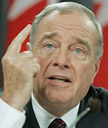 Yet Allan Gregg’s point still seems somewhat more compelling, on various grounds. And these grounds apparently include whether technical questions of parliamentary procedure allow enough time to get the job done – before the spring 2006 election that Paul Martin has already promised is so close at hand as to render the whole question academic in any case.
Yet Allan Gregg’s point still seems somewhat more compelling, on various grounds. And these grounds apparently include whether technical questions of parliamentary procedure allow enough time to get the job done – before the spring 2006 election that Paul Martin has already promised is so close at hand as to render the whole question academic in any case.
There may remain some slight chance that Jack Layton will very soon come around to the view that he has to join the Conservatives and the Bloc in bringing the government down right now, in the interests of his own integrity in the eyes of the electorate. But it must mean something even for Mr. Layton’s integrity that Justice Gomery has exonerated Paul Martin. And as Mr. Layton has already observed on TV, there will be a federal election soon enough regardless.
 Whatever exactly transpires over the next few days and weeks in the Ottawa hothouse, it is the people of Canada who will make the final judgment about what the Gomery findings mean for the future of the government of Canada. That is no doubt how it should be. (And thank god, some might want to add, for the old far northern system of parliamentary democracy.)
Whatever exactly transpires over the next few days and weeks in the Ottawa hothouse, it is the people of Canada who will make the final judgment about what the Gomery findings mean for the future of the government of Canada. That is no doubt how it should be. (And thank god, some might want to add, for the old far northern system of parliamentary democracy.)
Meanwhile, the big-name federal Liberal who may finally suffer most from Justice Gomery’s investigations is former prime minister Jean Chretien. In the very end history will be making the final judgments about him. And it will probably also remember that he did keep Canada out of the war in Iraq, engineer such domestic innovations as the Clarity Act, boost federal research and development support (as one Ottawa wise man has lately stressed), and otherwise keep the country officially together through some trying times.
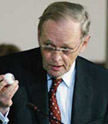 What Citizen Jean Chretien likely needs most right now is for his successors in all parties to ensure that there will be enough of a Canadian history in the future to bother making judgments about the careers of former Canadian prime ministers. Hopefully, Justice Gomery’s reports on the sponsorship scandal will ultimately be making some healthy contribution to this prospect as well. For the moment, if you are really up for it, you can already read the whole first report on the CBC website – and start to judge for yourself.
What Citizen Jean Chretien likely needs most right now is for his successors in all parties to ensure that there will be enough of a Canadian history in the future to bother making judgments about the careers of former Canadian prime ministers. Hopefully, Justice Gomery’s reports on the sponsorship scandal will ultimately be making some healthy contribution to this prospect as well. For the moment, if you are really up for it, you can already read the whole first report on the CBC website – and start to judge for yourself.
* * * * * *
UPDATES: (1) PUNDITS OF ONTARIO (which cast 37.6% of all votes cast in the June 2004 federal election, somewhat less than its 38.8% share of the 2004 Canada-wide population) … excerpts from November 2, 2005 columns on the first Gomery report, in Toronto’s version of Canada’s national newspaper … (2) OCT-25-27 IPSOS-REID POLLÂ (see further below).
Jeffrey Simpson from the anglophone central Canadian centre left, sort of:.
 “The amounts of money lost or illegally gained were rather small – certainly smaller than the huge cost of the Gomery inquiry itself – but the practices and assumptions behind the misdeeds were breathtakingly arrogant when they were not patently corrupt … .
“The amounts of money lost or illegally gained were rather small – certainly smaller than the huge cost of the Gomery inquiry itself – but the practices and assumptions behind the misdeeds were breathtakingly arrogant when they were not patently corrupt … .
“A program specifically designed to circumvent normal procedures has now produced even more steps inside government for getting anything done. A program intended to avoid layers of bureaucracy and red tape has already created more of both, with even more yet to come.
“That no surprises peppered the Gomery report was hardly surprising. The whole saga had been thoroughly aired to a stupefying extent …
“Yesterday’s report is not likely to shift the country’s politics …
“Those voters who were already outraged will find fresh reason in the report for their outrage; those who shrugged probably will shrug again. Those for whom the entire sponsorship file was irrelevant or boring will continue paying little or no attention, and eventually cast their ballot, if they even bother to vote, on other issues.
“The country had already more or less made up its political mind on the Gomery report before its release. By next April, when Canadians vote, the report won’t be a factor.”
John Ibbitson from the anglophone central Canadian centre right, sort of:
 “It’s official: The Liberal Party rigged the federal elections of 1997 and 2000 in Quebec … the party’s Quebec wing poured hundreds of thousands of dollars, maybe more, into riding campaigns, money that was stolen from the public purse …
“It’s official: The Liberal Party rigged the federal elections of 1997 and 2000 in Quebec … the party’s Quebec wing poured hundreds of thousands of dollars, maybe more, into riding campaigns, money that was stolen from the public purse …
“And yet the sun has risen again and still the Liberals rule … Paul Martin’s government remains in power even though the party has been forced to pay back more than $1-million in fraudulently obtained donations …
“The Liberals survive because the NDP isn’t ready to provoke a premature election. And since voters have already heard most of the allegations levelled at the Liberals, and since they don’t expect any better of that party, it is even possible that they will cast a reluctant Liberal vote when an election finally is called.
“But this is not the end. The corrosive effects of the sponsorship scandal will continue to eat away at the Liberal Party and at the country for months and years to come … the Liberals have lost Quebec, perhaps for good …
“The sponsorship poison also spreads across the entire country. The Gomery report describes what it calls a “culture of entitlement” among senior officials in the Liberal Party … that accepts the right of the perpetually governing party to use the grease of patronage to lubricate its rusty machine.
“Mr. Martin shows not the slightest discomfort with that culture … But the Conservatives alienate so many Canadians, for so many different reasons, that power continues to elude them, leaving this dysfunctional mess as a status quo with little hope of change.
“The civil war within the Liberal Party will continue, the opposition will tear at the government without actually bringing it down, and the public’s confidence in its institutions of government, which every study and poll show is declining, will further erode.
“The evil of the sponsorship scandal just goes on and on.”
Oct 25-27 Ipsos-Reid Poll
An Ipsos-Reid poll on Canadian federal party standings, taken October 25-27, 2005, just before the first Gomery report, has now been released, to add to the current confusion.
What party would you vote for in the next federal election?
|
Oct 27 |
Sep 29 |
Aug 18 |
|
|
Liberals |
38% |
37% |
36% |
|
Conservatives |
26% |
27% |
28% |
|
New Democrats |
18% |
17% |
17% |
|
Bloc Quebecois |
11% |
14% |
11% |
|
Green |
5% |
4% |
6% |
Provincial Breakdown (Oct. 25 to Oct. 27)
|
BC |
Alta |
Man/Sask |
Ont |
Que |
Atl Can |
|
|
Libs |
37% |
25% |
39% |
42% |
33% |
51% |
|
Cons |
27% |
50% |
35% |
30% |
7% |
31% |
|
ND |
26% |
14% |
21% |
20% |
10% |
15% |
|
BQ |
47% |
|||||
|
Green |
9% |
9% |
3% |
6% |
2% |
1% |
Source: Ipsos-Reid / CanWest Global
Methodology: Telephone interviews with 2,000 Canadian adults, conducted from Oct. 25 to Oct. 27, 2005. Margin of error is 2.2 per cent.
